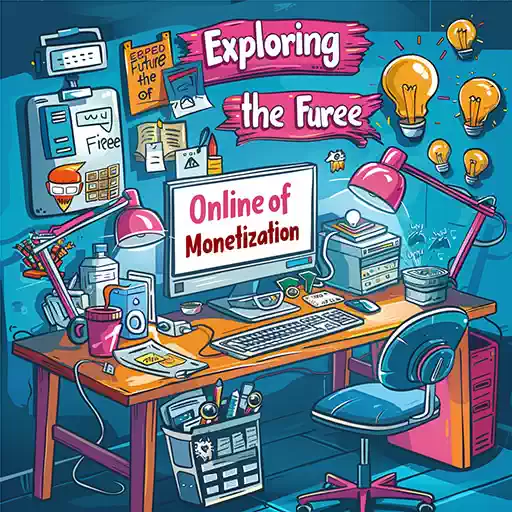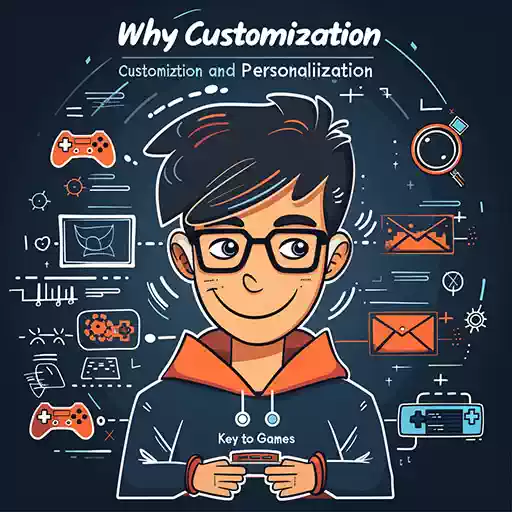Exploring the Future of Free Online Game Monetization
The answer lies in monetization strategies that allow game developers to earn revenue while keeping their games accessible to everyone. As the industry continues to evolve, so too do the methods of monetizing free online games. In this article, we’ll explore the future of free online game monetization, diving into the key trends, ethical considerations, and innovative approaches that are shaping how developers generate revenue while maintaining a positive player experience.

1. The Shift from Premium to Free-to-Play
Before diving into the future, it’s important to understand how we got here. The traditional gaming model involved players paying a one-time fee to purchase a game, also known as the premium model. However, as the gaming industry evolved, developers began experimenting with free-to-play models, allowing players to download and play a game for free while offering in-game purchases as an alternative revenue source.1.1 The Rise of Microtransactions
In-game purchases, also known as microtransactions, quickly became one of the most popular ways to monetize free-to-play games. These transactions allow players to spend real money on virtual goods, such as character skins, weapons, boosts, or in-game currency. While each individual purchase might seem small, the sheer volume of players engaging in microtransactions has turned this model into a billion-dollar industry.For instance, Epic Games’ Fortnite has generated billions in revenue through cosmetic purchases alone, even though the game itself is free. Microtransactions give players the opportunity to personalize their experience, offering items that enhance the game visually without providing a competitive advantage.
1.2 Battle Passes and Subscriptions
Another successful monetization strategy that has emerged in recent years is the battle pass system. Instead of traditional microtransactions, battle passes offer a tiered progression system where players can unlock exclusive rewards over time by completing in-game challenges. Players pay for access to the battle pass, which typically spans a set period (such as a season or month), offering both free and premium rewards.This model strikes a balance between keeping the game free while encouraging regular engagement, as players must return to the game consistently to unlock all of the available rewards. The battle pass system has been used successfully in games like Fortnite, Apex Legends, and Call of Duty: Warzone.

2. Future Trends in Free Online Game Monetization
While microtransactions and battle passes are still dominant forces in the gaming industry, the future of free online game monetization is evolving in exciting new directions. Developers are constantly searching for ways to balance revenue generation with player satisfaction, and several emerging trends are set to shape the future of how free games make money.2.1 Player-Driven Economies
One trend gaining traction in the gaming industry is the concept of player-driven economies. In these games, players have more control over the game’s economy, with the ability to buy, sell, and trade in-game items with each other. This model has been popularized by games like Counter-Strike: Global Offensive and Dota 2, where players can trade rare skins or items on third-party marketplaces.Player-driven economies allow players to monetize their in-game achievements by trading rare or valuable items with other players. This creates a more dynamic in-game marketplace and gives players an additional incentive to engage with the game. As blockchain technology continues to develop, we may see even more decentralized, player-driven economies where in-game assets can be bought and sold using cryptocurrency or non-fungible tokens (NFTs).
2.2 The Rise of Play-to-Earn Models
Another innovative approach gaining popularity is the play-to-earn (P2E) model. This monetization strategy flips the traditional model on its head by allowing players to earn real-world money through their in-game achievements. Play-to-earn games, such as Axie Infinity and The Sandbox, allow players to earn cryptocurrency or in-game tokens that can be traded for real currency.This model not only monetizes player time and skill but also fosters a more invested and engaged player base. By rewarding players for their time and effort, play-to-earn games have the potential to attract a new wave of players who see gaming not just as entertainment, but as a legitimate way to earn income.
2.3 Advertisements and Sponsorships
Another trend shaping the future of free game monetization is the increasing role of advertisements and brand sponsorships. While in-game ads have been present in mobile gaming for years, they’re becoming more sophisticated and less intrusive. For example, rewarded ads allow players to choose to watch an ad in exchange for in-game rewards, such as extra lives or currency. This model offers a win-win scenario, where players receive something of value, and advertisers gain exposure.In addition to ads, brand partnerships are becoming a significant revenue stream for free games. Collaborations between game developers and big-name brands—such as Fortnite’s partnerships with Marvel, Nike, and Travis Scott—offer exclusive, branded content within the game. These sponsorships not only generate revenue but also create cultural moments that elevate the game’s profile.

3. Ethical Considerations in Game Monetization
While the future of game monetization is filled with exciting possibilities, it’s essential to acknowledge the ethical challenges that come with these strategies. The rise of microtransactions and loot boxes has sparked debates about predatory practices, especially when it comes to younger or vulnerable players. As the industry evolves, so too must its approach to balancing profitability with responsibility.3.1 Avoiding Pay-to-Win Models
One of the biggest criticisms of free-to-play games is the pay-to-win model, where players can purchase items or abilities that give them a competitive advantage. This can create an unfair playing field, where players who spend money are more likely to succeed than those who don’t. As a result, pay-to-win models have been widely criticized for ruining player balance and creating a negative experience for those unwilling or unable to spend money.To avoid these pitfalls, game developers must prioritize cosmetic or non-competitive purchases. At FOGYX, we focus on offering players aesthetic or customization options through our monetization strategies, ensuring that everyone can enjoy the game on an equal footing, regardless of how much money they spend.
3.2 Transparency and Fairness
Transparency is key when it comes to monetization, especially in the context of loot boxes or other randomized rewards. Players should know what they’re paying for and should feel confident that the system is fair. Some countries have even begun regulating loot boxes, labeling them as a form of gambling.As the industry moves forward, developers need to ensure that their monetization strategies are transparent and ethical. This could include disclosing the odds of receiving specific items, offering alternative ways to earn rewards, or implementing limits on how much players can spend in a given period.
3.3 Prioritizing Player Satisfaction
Ultimately, the success of any monetization strategy hinges on one thing: player satisfaction. If players feel that a game’s monetization practices are fair, transparent, and don’t impede their enjoyment, they’re more likely to engage with in-game purchases. However, if they feel exploited or pressured to spend money, they’ll likely abandon the game altogether.At FOGYX, we prioritize player feedback when designing our monetization strategies. By listening to our community and implementing systems that enhance, rather than detract from, the player experience, we’re able to create a sustainable, long-term relationship with our audience.

4. The Future: A Balance of Innovation and Responsibility
As free online games continue to dominate the gaming landscape, the future of monetization will be defined by a balance between innovation and responsibility. Game developers must explore new revenue streams while ensuring that players feel respected and valued. Whether through player-driven economies, play-to-earn models, or transparent microtransactions, the future of free game monetization is filled with exciting potential.4.1 The Role of Blockchain and NFTs
One of the most exciting possibilities for the future of game monetization lies in blockchain technology and non-fungible tokens (NFTs). These technologies could revolutionize how players buy, sell, and trade in-game assets, offering true ownership over digital items. Imagine being able to take a rare skin or weapon you earned in one game and sell it in another, or even cash it out in the real world.Blockchain could also enable more decentralized gaming ecosystems, where players have greater control over their assets and economies are player-driven rather than developer-controlled. While still in its early stages, blockchain gaming could reshape the way we think about game ownership and monetization in the years to come.
4.2 Sustainable Monetization Strategies
As the gaming industry moves forward, there will be a growing emphasis on sustainable monetization strategies—ones that keep players engaged without pushing them toward exploitative spending habits. Developers will need to focus on creating value-driven experiences, where players feel like they’re getting something meaningful in return for their investment.At FOGYX, we’re committed to exploring new, innovative monetization models that respect our players and provide them with options that enhance their gaming experience.
By focusing on transparency, fairness, and ethical practices, we’re shaping a future where free online games can thrive without sacrificing player satisfaction.
Conclusion: Monetizing the Future of Gaming
The future of free online game monetization is an exciting frontier, filled with possibilities for both developers and players. From microtransactions and battle passes to blockchain-based economies and play-to-earn models, the industry is constantly evolving. However, as these new monetization strategies take shape, developers must remain mindful of the ethical considerations that come with them.At FOGYX, we believe that the best monetization strategies are those that put players first. By creating fair, transparent, and value-driven systems, we’re committed to building a future where free games can continue to thrive while keeping our community at the heart of everything we do.
22 December 2024
More articles

Imagine launching a game, and right off the bat, you get to design your own character—choosing every detail from their hairstyle to their armor color. You pick abilities, shape their journey, and even create a world that reflects your personal preferences. This isn’t just a trend; it’s the future of gaming. Customization and personalization have become key elements in modern game design, and they’re here to stay.

When you think back on your favorite games, what comes to mind? Is it the epic boss battles or the captivating worlds you explored? While these elements are certainly important, for many gamers, it’s the characters that leave the most lasting impression. Characters who feel real, who grow and change as the story unfolds, who evoke emotions, and who become a part of your gaming journey—these are the characters that define a great game.

When it comes to creating a memorable game, what’s the secret sauce? Is it the fast-paced action? The intricate storylines? Or perhaps it’s the precise, rewarding gameplay mechanics? The truth is, what makes a great game often lies in the perfect blend of several elements, working together to create an immersive, enjoyable experience. At FOGYX, we understand that players expect more than just entertainment—they crave engagement, challenge, and emotional connection.
all articles
